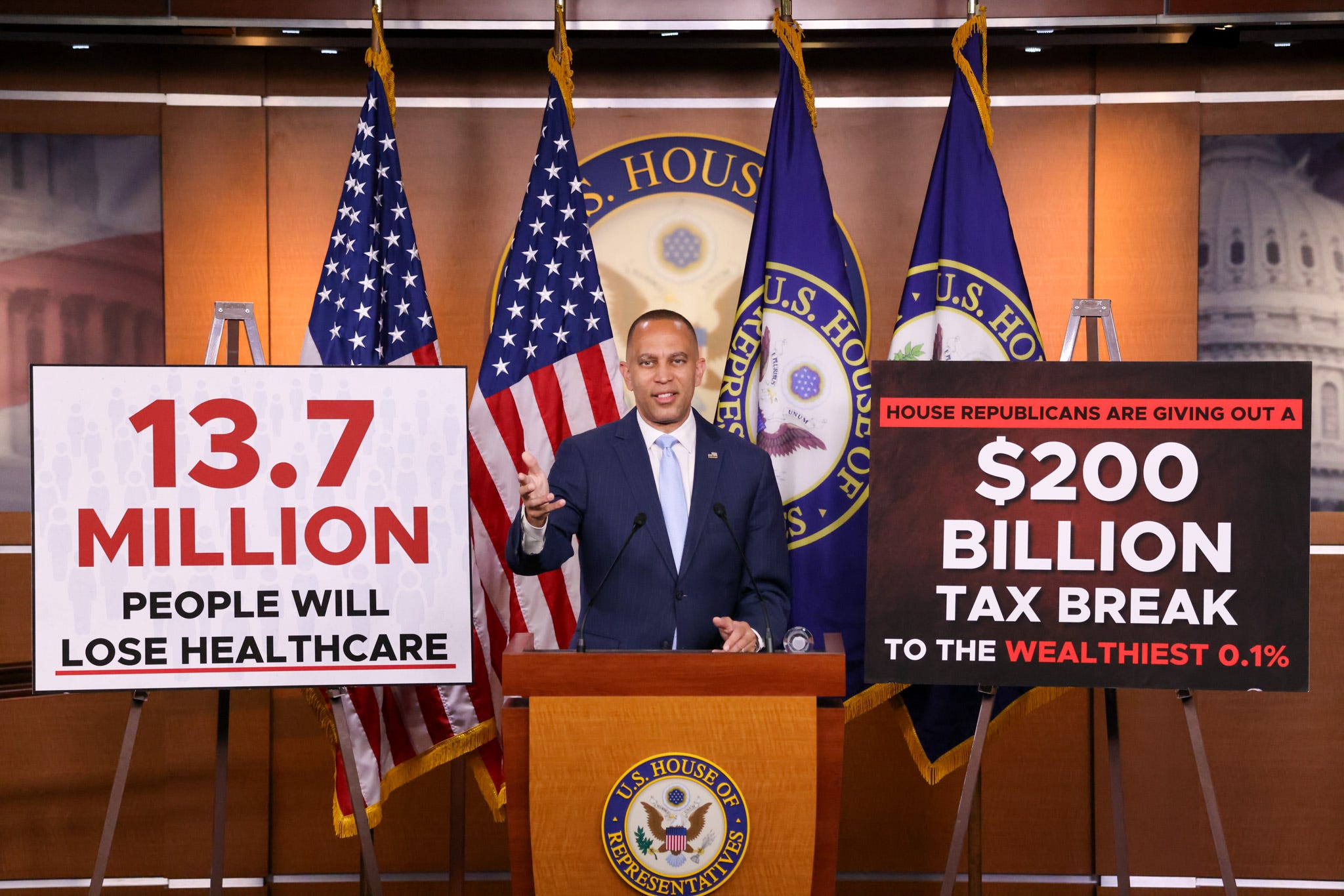The committee Democrats taking center stage as Republicans push their megabill
House Democratic Leader Hakeem Jeffries is betting on Richie Neal, Frank Pallone, and Angie Craig to lead the fight against deep GOP cuts to taxes, health care, and food assistance.

Even as President Donald Trump commands the spotlight in the Middle East and House Republican leaders scramble to disarm the legislative landmines buried in a sweeping megabill that would slash health care benefits and food assistance while cutting taxes for the wealthy, the real action this evening is unfolding in three often-overlooked committee rooms—where Democrats say they’re fighting back with everything they’ve got.
But the pushback isn’t coming from the party’s most visible figures. Instead, it’s being led by the ranking members of three powerful panels—Richie Neal (Ways and Means), Frank Pallone (Energy and Commerce) and Angie Craig (Agriculture)—tasked with defending Democrats’ economic and moral priorities at a moment of high stakes and higher consequences.
These less-flashy lawmakers are marshaling a unified Democratic counteroffensive to highlight the GOP’s tilt toward the wealthy while sounding the alarm over rising costs for working families.
“They have been leading the charge, along with all the distinguished members of those three committees,” House Minority Leader Hakeem Jeffries (D-N.Y.) told Once Upon a Hill this morning. “They really do represent and capture the gorgeous mosaic of the caucus and the gorgeous mosaic of the American people in every possible way in terms of diversity—that includes ideological, racial diversity, gender diversity, age diversity and life-experience diversity.”
Jeffries added that Americans tuning into any of the markups this evening or tomorrow will be impressed by what they see from Neal, Pallone, Craig, and their lieutenants.
“We all are unified in trying to stop these extreme MAGA Republicans from jamming another GOP tax scam that benefits the wealthy, the well-off and the well-connected and takes health care away from the American people down our throats,” he said. “It is an egregious and outrageous bill and it runs directly contrary to the central Republican promise that was made in 2024, which is that they were going to fix the economy and lower the high cost of living. They’ve done neither. They are blowing up the economy in real time and raising costs, and they’re going to be held accountable for the mess that they are creating.”
Before turning to the substance of each GOP-crafted bill, it’s worth knowing more about the Democrats shaping the response.
Neal, who became the top Democrat on the Ways and Means Committee in 2017, has spent the last several years at the center of nearly every major economic package passed by Democrats—from the CARES Act and American Rescue Plan to the Inflation Reduction Act and SECURE 2.0 retirement reforms.
Pallone, a longtime New Jersey lawmaker and former chair of the Energy and Commerce Committee, has made prescription drug pricing and healthcare expansion central to his career, with a legislative record that spans from the Affordable Care Act to the end of surprise billing and the phasing out of dangerous climate pollutants.
And Craig, a Minnesotan who became the first woman to serve as the top Democrat on the Agriculture Committee earlier this year, took on the role in the wake of a generational reshuffling within the caucus following former President Joe Biden’s decision to step aside. A former journalist who grew up relying on food assistance, Craig brings a lived experience to the fight over SNAP that few in Congress can claim.
Now, they’re tasked with confronting what Democrats view as one of the most consequential—and dangerous—bills of the Trump era.
The Ways and Means portion of the bill, led by Chairman Jason Smith (R-Mo.), includes an extension of Trump’s 2017 tax cuts and new deductions for taxes on overtime, tips, and car loan interest—policies that would cost roughly $3.7 trillion over ten years, according to the Joint Committee on Taxation, while disproportionately benefiting upper-income households and corporations. Democrats argue the package doubles down on trickle-down economics and explodes the deficit.
Over at the Energy and Commerce Committee, Republicans are proposing more than $880 billion in Medicaid cuts, primarily by tightening eligibility, reinstating work requirements, and scaling back the enhanced subsidies for ACA coverage enacted under President Biden. Pallone and fellow committee Democrats warn that the plan would destabilize coverage for millions while shifting enormous administrative burdens to the states.
The Agriculture Committee markup, led by Craig on the Democratic side, focuses on the GOP’s proposed $230 billion in SNAP cuts, raising the age cap for work requirements, restricting eligibility for certain legal immigrants, and eliminating the SNAP-Ed nutrition education program. Craig has called the proposal “cruel and shortsighted,” warning that it would hit both low-income families and rural economies hard, particularly amid Trump’s escalating trade war.
House Republicans say their sweeping tax and spending plan is designed to restore fiscal discipline and put the country on a stronger long-term footing. But Democrats aren’t buying it, especially not from a party they argue has repeatedly driven up the deficit while handing out tax breaks to the wealthy.
Asked whether he believes the United States has a spending problem, Jeffries rejected the GOP’s framing outright.
“The notion that Republicans are fiscally responsible is laughable,” he said. “They have repeatedly inherited an improved fiscal situation, and then proceeded to blow up the debt and the deficit, just like George W. Bush did, just like Reagan did, and now Republicans are doing it again.”
Jeffries pointed to Trump’s 2017 tax cuts and the JCT’s estimate that the GOP megabill would add trillions to the federal deficit, despite targeting programs like Medicaid and SNAP for deep cuts.
“We are not going to be lectured about fiscal responsibility by a bunch of people who have repeatedly spent the taxpayer dollars like drunken sailors,” he said, “in order to get their billionaire MAGA donors like Elon Musk, in this particular instance, a tax cut.”
No matter how forcefully Democrats oppose the GOP’s megabill—through amendments, public messaging or committee debate—the reality is that Republicans can still pass it with simple majorities in both chambers if they stay unified. The reconciliation process leaves little room for procedural resistance, making party discipline the only hurdle between the Trump-aligned agenda and enactment.
That won’t stop Democrats from seeing their opposition through to the finish line, House Assistant Minority Leader Joe Neguse (D-Colo.), a close ally of Jeffries who works closely with the rankers, told Once Upon a Hill.
“I think our ranking members, and I think the members of the full committees on the Democratic side, have been incredibly effective in communicating the contrast in terms of the devastating impacts and real-world consequences that the reconciliation budgetary plans would have on communities across the country—juxtaposed against what we stand for, which is fighting for working families,” he said. “And we’re going to have to do more of that in the coming weeks.”



